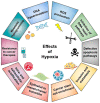Hypoxia-Driven Effects in Cancer: Characterization, Mechanisms, and Therapeutic Implications
- PMID: 33808542
- PMCID: PMC8003323
- DOI: 10.3390/cells10030678
Hypoxia-Driven Effects in Cancer: Characterization, Mechanisms, and Therapeutic Implications
Abstract
Hypoxia, a common feature of solid tumors, greatly hinders the efficacy of conventional cancer treatments such as chemo-, radio-, and immunotherapy. The depletion of oxygen in proliferating and advanced tumors causes an array of genetic, transcriptional, and metabolic adaptations that promote survival, metastasis, and a clinically malignant phenotype. At the nexus of these interconnected pathways are hypoxia-inducible factors (HIFs) which orchestrate transcriptional responses under hypoxia. The following review summarizes current literature regarding effects of hypoxia on DNA repair, metastasis, epithelial-to-mesenchymal transition, the cancer stem cell phenotype, and therapy resistance. We also discuss mechanisms and pathways, such as HIF signaling, mitochondrial dynamics, exosomes, and the unfolded protein response, that contribute to hypoxia-induced phenotypic changes. Finally, novel therapeutics that target the hypoxic tumor microenvironment or interfere with hypoxia-induced pathways are reviewed.
Keywords: chemoresistance; hypoxia; hypoxia-inducible factors; metastasis.
Conflict of interest statement
The authors declare no conflict of interest.
Figures




References
Publication types
MeSH terms
Grants and funding
LinkOut - more resources
Full Text Sources
Other Literature Sources
Medical

